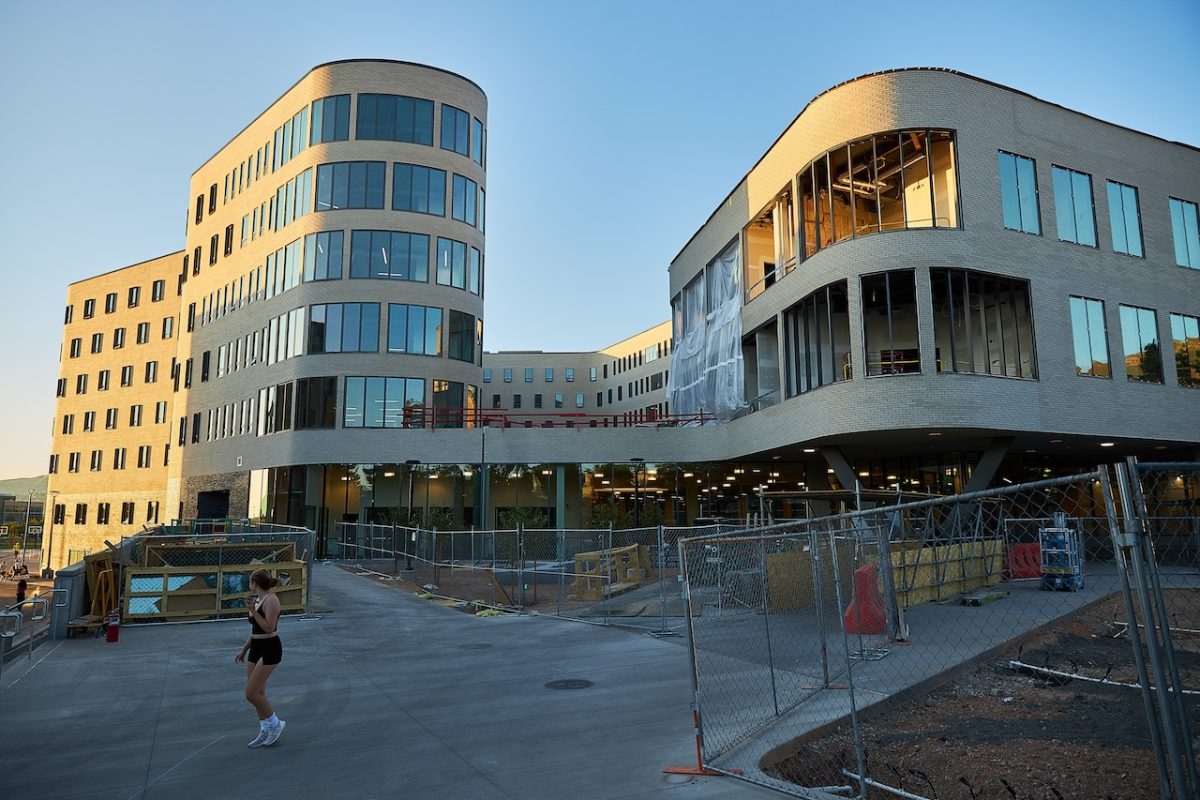The opening of the Impact and Prosperity Epicenter has added 778 new beds on campus. However, the administrative offices for the Sorenson Impact Institute and the Center for Business, Health and Prosperity are still under construction. They are expected to open in the next few weeks.
The Impact and Prosperity Epicenter
“It’s been years in the making,” Chad Salvadore, the chief financial officer of the Sorenson Impact Institute, said. “With any big building like this, it started with a concept phase.”
Salvadore explained that the intention of creating the Impact and Prosperity Epicenter was to increase the amount of students that the Sorenson Impact Institute and Center for Business, Health and Prosperity are able to reach.
The Epicenter is made up of three separate parts according to the building’s website. These parts include six floors of residential spaces and offices for the Center for Business, Health and Prosperity and the Sorenson Impact Institute. The Epicenter also has an open forum on the first floor for speakers, trainings and workshops. It also includes a public, full-service cafe.
Jacob Theuson, a student project intern and Epicenter resident recently moved into a four-person apartment at the Epicenter. Classic single and double-bed rooms, eight-person apartments and “end cap communities” are also available.
“I think [the apartment] is awesome,” Theuson said. “Just having our own little individual rooms, as well as a common area for us to share with a kitchen and a living room is pretty sweet.”
Salvadore said that including apartment-style rooming options at the Epicenter was very intentional.
“We didn’t want this to just be a first year space, we wanted there to be a nice mix,” Salvadore said. “It’s not exactly a 50/50 mix, but it’s close to 50% first-year students and 50% upper-division students.”
Upper-division Epicenter resident Colton Hawkins said, “At first glance, it’s very industrial. But I think putting up more stuff and decorating makes it more homey.”
Salvadore said that construction on the office spaces in the building will be complete within the next few weeks. All of the residential spaces are complete, however.
“Just like [faculty] doesn’t have access to the residential spaces, students won’t have full access to our offices,” Salvadore said.
Programs Behind the Epicenter
The Center for Business, Health and Prosperity is an organization for faculty, staff, students and partners to advance and engage prosperity science.
“We focus on integrating innovation and entrepreneurship with health-enabling practices in pursuit of economic, social and political well-being,” the center’s website reads. “Prosperity science is about discovering what makes this type of progress happen and ways to expand it.”
The Sorenson Impact Institute helps organizations achieve their impact vision by connecting capital to social and environmental solutions. It also helps organizations measure, report, improve impact and assists in training future impact leaders.
These programs are not new to the U.
“We’ve been here for well over 10 years,” Salvadore said while speaking on behalf of Sorenson Impact Institute. “So, the building is new, but our programming is already up and running.”
Salvadore described one project the Sorenson Impact Institute is involved in.
“We’re going to do a live case study, where we’ve got an inventor in Kenya that developed a low tech but highly effective light that scares off lions,” Salvadore said. “Because of that, lions have stopped eating livestock within the local community.”
Theuson shared his experience establishing better healthcare in Ghana with the Center for Business, Health and Prosperity.
“It was focused on how we can take a look at their healthcare systems and establish community relationships in order to better build upon those and bring better healthcare to them,” Theuson said.
Both Salvadore and Theuson suggest that if students are curious about the Impact and Prosperity Epicenter, the best thing to do is come in and check it out. The forum space is open to all students at the U.
Throughout the year the Epicenter will also be hosting events for students to participate in and learn more about what the Epicenter has to offer.
“Do your best to get involved,” Theuson said. “There are so many awesome events we have planned. I’ll also note that there’s pretty much always free food at all of the events. So, if you’re coming for that, come for that.”




